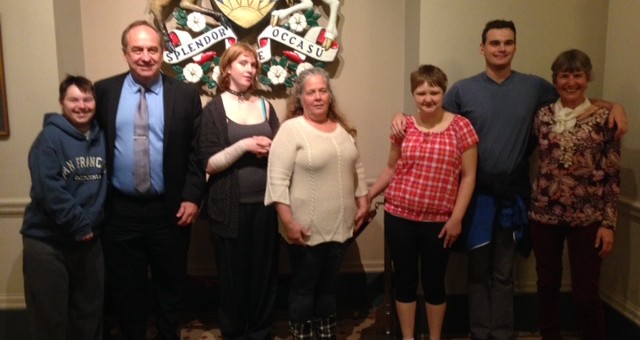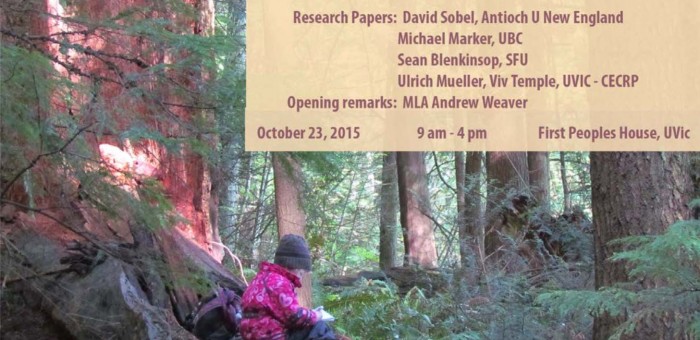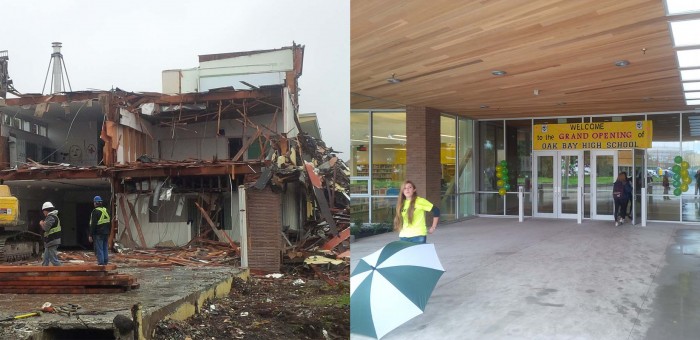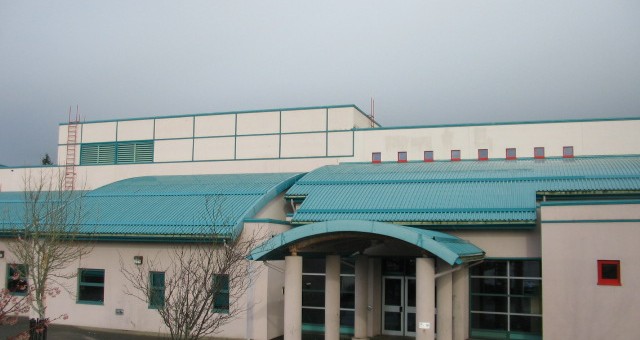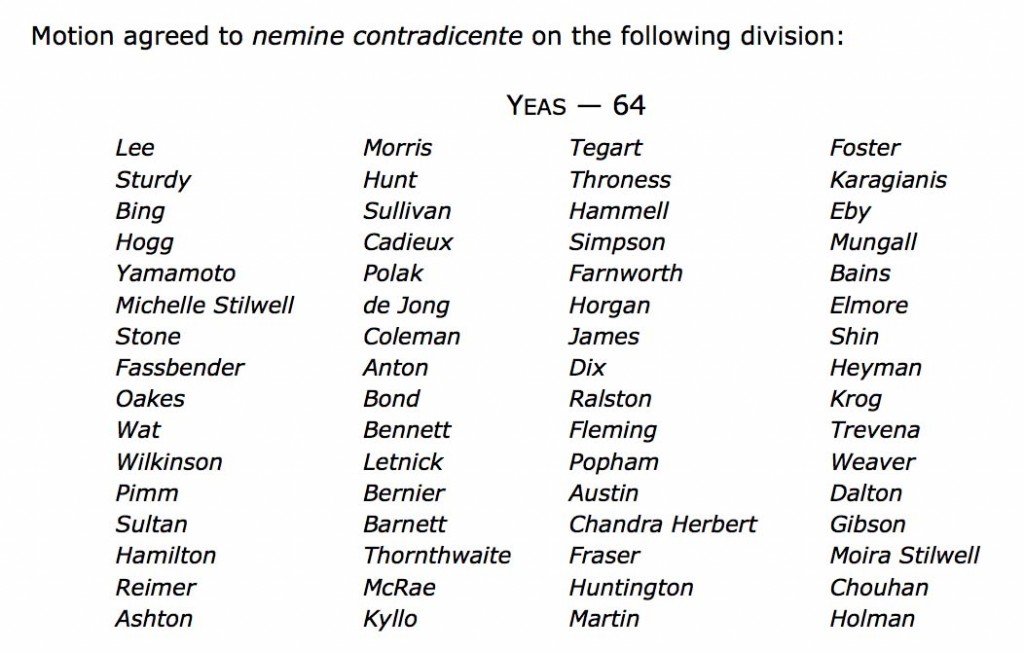Education
Welcoming a Class from South Island Distance Education
One of the joys of being an MLA is welcoming students of all ages to the Legislature, showing them some of the history and beauty of the building and on occasion introducing them in the House. Today was one of those pleasurable days.
I had the distinct pleasure of meeting a class of special needs students from the South Island Distance Education School (SIDES). These are young adults transitioning from high school who are learning life and social skills, increasing their reading and math levels and learning about the community. SIDES offers a wide range of courses and classes, often through the internet, to students throughout the province with a teaching and support staff dedicated to ensuring school children and young adults of all abilities can obtain the education credits to graduate, and skills to enter the work force or post-secondary courses.
Thank you to the teachers Elaine Ethier and Dana (pronounced as in banana) Crow for bringing the students Becky Hansen, Joel Wright, Ben Vanlierop and Emily Medwid. It was a delight to be able to introduce all of you in the House today.
The Wonders of Nature Research Day
Today I was afforded the honour of delivering the opening the opening remarks at the Wonders of Nature Research Day put on by UVic’s Centre for Early Childhood Research and Policy. The research days featured presentations by a number of distinguished scholars including:
- David Sobel, Department of Education, Antioch University, New England
- Michael Marker, Department of Educational Studies, University of British Columbia
- Sean Blenkinsop, Faculty of Education, Simon Fraser University
- Ulrich Mueller, Department of Psychology, University of Victoria
- Viv Temple, School of Exercise Science, Physical and Health Education, University of Victoria
- Enid Elliott, School of Health and Human Services, University of Victoria
Below is the text of my opening remarks.
Text of Opening Remarks
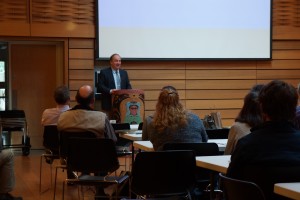 I would like to start off by thanking Beverley and everyone at the Centre for Early Childhood Research and Policy for inviting me here today and for organizing this wonderful conference. As Beverley pointed out, my name is Andrew Weaver and I’m the Member of the Legislative Assembly representing the riding of Oak Bay-Gordon Head — home to the University of Victoria.
I would like to start off by thanking Beverley and everyone at the Centre for Early Childhood Research and Policy for inviting me here today and for organizing this wonderful conference. As Beverley pointed out, my name is Andrew Weaver and I’m the Member of the Legislative Assembly representing the riding of Oak Bay-Gordon Head — home to the University of Victoria.
I have been in the Legislature for about two and a half years now, but before that I actually worked right here at UVic as a Faculty Member in the School of Earth and Ocean Sciences. In parallel with my endeavours in research, I’ve spent a good deal of time engaging the public in discussions about the importance of nature and our environment, and the detrimental path we are headed down if we don’t take action to reduce ongoing loading of the atmosphere with greenhouse gases that are causing global warming.
While it is easy to become disillusioned and worn out working in the field of climate science — seeing the path we’re headed down and fighting an uphill battle to try and make governments and policy makers see it too — it is our children and youth that inspire me — give me hope for the future — and keep me optimistic after so many years in this field.
In fact, one of my favourite parts about my role as MLA, is being able to go into schools and universities and speak to children and youth about our environment and the importance of civic engagement. Seeing their keen interest and appreciation for our natural environment and their desire to make our world a sustainable place is truly what inspires me in my daily work down in the legislature.
Because of this, I was very honoured when I was asked to provide opening remarks here today — I’m just disappointed I won’t be able to stick around to learn about the fantastic research that is being done in this area.
I was actually fortunate enough to experience a nature school program first-hand about a year and a half ago. I was invited by Savory Elementary School to be an “Eco Expert” for their “4 Seasons Eco School”. The program, which I believe was in its inaugural year when I visited, ran each Wednesday and provided all students with the opportunity to learn outside in Savory’s surrounding ecosystem, bringing in a new guest expert each week to guide the children.
I got to spend an entire day, from 8:30 in the morning to 2:30 in the afternoon, delivering a lesson plan to seven separate classes and engaging with every grade from Kindergarten to grade 6. To say that I was exhausted by the end of it would be an understatement, but it was also a truly unforgettable and inspiring experience — and helped to further my respect and appreciation for our teachers who do far more than I did, but on a daily basis.
Over the last decade as a scientist I’ve also had the privilege of working with school districts across Vancouver Island to install more than 150 weather stations on schools (Islandweather.ca for those who are interested), and to develop learning resources, in collaboration with teachers, to allow them to deliver their curriculum using state-of the art instrumentation and an authentic learning experience. Getting out of the ivory tower and into the community to discuss science, weather and our natural environment has been — to be perfectly frank — the single most satisfying and rewarding experience I have had as a scientist.
In today’s technology driven world, where young children are spending as much as eight hours a day interacting with screens — and often less than an hour a day actually outside – I firmly believe that providing children with the opportunity to experience “the wonders of nature” is one of the most important things we can do to help foster their development. While I am by no means an expert in the topic — you will hear from them later — I do know that there is a vast amount of research to demonstrate just how important time spent outdoors is to early development. Studies have shown that children who interact with nature on a daily basis are healthier, happier, more creative and less stressed than those who don’t.
And these benefits are not only felt in childhood. Researchers continue to develop a better understanding of the lasting impacts that early childhood experiences can have on our lives. Whether we remember the experience or not, and whether we are aware of magnitude of those experiences or not, they can stick with us throughout our entire lives. We carry them with us through our adolescent and teen years, into young adulthood and beyond. Developing an understanding and appreciation of nature at an early age will have a lasting effect on children.
And these benefits will not just be felt by the children fortunate enough to experience this type of learning environment. They will be felt by their peers, their families, their communities, and society as a whole. They will impact the way they interact with other people, the way that they view and interact with their environments — both built and natural, and the way that they engage in their future careers.
In a few decades, the children that we’re talking about today will be our teachers, our researchers, our scientists, our policy makers, and our government leaders. They will be making the decisions that influence our society, implementing the policies that protect our environment, and educating an entire future generation of children on the importance of our natural world. So the fact that you are all here today, discussing such an important initiative, is a truly inspiring sight to see!
Thank you again for having me here to speak today and enjoy the rest of the conference!
Celebrating the Opening of the New Oak Bay Secondary School
Today was my turn to read a member’s statement in the house. I took the opportunity to celebrate the grand opening of the new Oak Bay Secondary School.
Statement
Yesterday I, along with the Minister of Education, had the distinct honour of attending the grand opening of the new Oak Bay Secondary School. Four young leaders representing Oak Bay’s four pillars of excellence brought a personal message to the audience, a message building upon comments they received this past spring from alumni who passed them the torch.
Academics was represented by Robert Lee, winner of the 2014 Michael Smith Science Challenge, as Canada’s top grade 10 science student.
Athletics was represented by rugby and track star, Matti Grant.
Fine arts was represented by actress Veronique Beaudet, who performed magnificently as Belle in February’s production of Beauty and the Beast.
Community leadership and philanthropy was represented by Ruby Tang, a leader in her school and outstanding ambassador for youth in so many ways.
Oak Bay Secondary also has a critical and foundational pillar in Mr. Dave Thomson, their principal. Without his tireless efforts to guide the school through the transition from the old to the new, we would not have been in a position to celebrate the successes we did yesterday. Oak Bay Secondary students have a rich history of success in each of its four pillars of excellence.
As an example of leadership, take Ian Cameron, student council president during my 1979 grad year, who is now an ABC news executive producer and married to the U.S. national security advisor, Susan Rice. They are some of President Obama’s favourite dinner guests.
As an example in academics, there’s 1937 Oak Bay grad, Pierre Berton, one of Canada’s most celebrated non-fiction writers and storytellers.
In athletics, Oak Bay has produced several generations of international rugby stars, including Donald Carson, Norm Hadley, Winston Stanley and Mark Wyatt. Our very own Kelly Dukeshire, a security officer in this Legislature, was a much-celebrated national basketball star and a 1978 grad. And in the area of fine arts, Roy Henry Vickers, a household name and distinguished First Nations artist, author and speaker, was a member of the class of 1965.
I want to offer my sincere thanks to all the dedicated teachers, administrators and staff at Oak Bay Secondary School. Collectively, they have contributed so much to the success of their students and the wonderful culture that exists at the school.
I also want to acknowledge, with gratitude, the dedicated school district leadership, my predecessor Ida Chong and this government for their ongoing commitment to build a remarkable new facility — the wonderful, new Oak Bay Secondary School.
Video of Statement
Grand Opening of Oak Bay Secondary School
 Today I had the distinct honour to attend the grand opening of the new Oak Bay Secondary School. Honourable Mike Bernier, British Columbia’s new Education Minister (right), Nils Jensen, Mayor of Oak Bay (right) and I gave brief speeches at the ceremony. Further presentations were given by Deborah Nohr, Trustee in School District 61 and Piet Langstraat, School District 61 Superintendent.
Today I had the distinct honour to attend the grand opening of the new Oak Bay Secondary School. Honourable Mike Bernier, British Columbia’s new Education Minister (right), Nils Jensen, Mayor of Oak Bay (right) and I gave brief speeches at the ceremony. Further presentations were given by Deborah Nohr, Trustee in School District 61 and Piet Langstraat, School District 61 Superintendent.
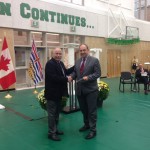 Dave Thomson, principal of Oak Bay Secondary School (left) was the Master of Ceremonies. He also introduced four students, each representing one of Oak Bay’s Pillars of Excellence: Academics (Robert Lee), Athletics (Matti Grant), Fine Arts (Veronique Beaudet) and Community Leadership and Philanthropy (Ruby Tang). These young leaders brought their own personal message to the large crowd – a message building upon comments they received this past spring from Alumni who passed them the torch (signifying a passage from the old school to the new).
Dave Thomson, principal of Oak Bay Secondary School (left) was the Master of Ceremonies. He also introduced four students, each representing one of Oak Bay’s Pillars of Excellence: Academics (Robert Lee), Athletics (Matti Grant), Fine Arts (Veronique Beaudet) and Community Leadership and Philanthropy (Ruby Tang). These young leaders brought their own personal message to the large crowd – a message building upon comments they received this past spring from Alumni who passed them the torch (signifying a passage from the old school to the new).
Of course, while Oak Bay has four Pillars of Excellence from a student perspective, the school has a critical and foundational pillar in Mr. Dave Thomson. Without his tireless effort to guide the school through the transition from the old to the new, we would not have been in a position to celebrate the successes we did today.
Below is the text of my address:
Text of my Speech
Minister Bernier, Mayor Jensen, Distinguished Guests, Principal Thomson, Staff and especially Oak Bay Secondary School Students:
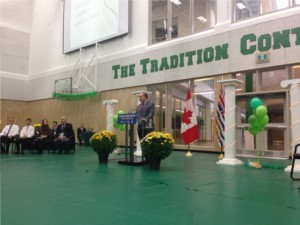 It is a distinct honour for me to be standing here before you as the MLA for Oak Bay Gordon Head. But even more importantly, it’s an honour for me to be here before you as a member of the Oak Bay class of 1979.
It is a distinct honour for me to be standing here before you as the MLA for Oak Bay Gordon Head. But even more importantly, it’s an honour for me to be here before you as a member of the Oak Bay class of 1979.
When I see you, the students in the audience, I see a future full of hope and opportunity. You, the youth of today, are an inspiration to me. Your passion is infectious. Your innovation and creativity fills me with hope. Your desire to make the world a better place through your community leadership is profoundly appreciated. Thank you for all you have done and all that you will continue to do for the betterment of the world around us.
If you are in Grade 9, we’re now in the only Oak Bay Secondary School you will ever know. For the older students, you have been witness to years of construction and upheaval as the new school was being built. It must be extremely exciting to finally transition into your new school.
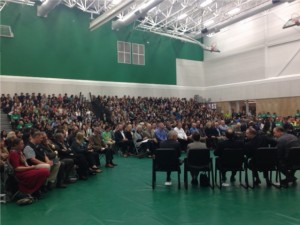 There is so much to be proud of at Oak Bay Secondary. Collectively you have excelled in all your Pillars of Excellence: Academics, Athletics, Fine Arts and Community Leadership and Philanthropy.
There is so much to be proud of at Oak Bay Secondary. Collectively you have excelled in all your Pillars of Excellence: Academics, Athletics, Fine Arts and Community Leadership and Philanthropy.
Let me give you but a few examples. In the area of Leadership, Ian Cameron, student council president during my grad year is now an ABC News executive producer and married to the US National Security Advisor, Susan Rice – they are some of President Obama’s favourite dinner guests. To Academics: At my graduation, Pierre Berton, one of Canada’s most celebrated non-fiction writers and storytellers, and himself a member of the 1937 graduating class, addressed my class of 1979. To Athletics: Donald Carson, Norman Hadley and Mark Wyatt, some of Canada’s most highly regarded rugby stars are all graduates from Oak Bay (around the time I was playing rugby at this school). And to Fine Arts: Roy Henry Vickers, a household name and distinguished First Nations artist, author and speaker whose work can be found around the world was a member of the class of 1965.
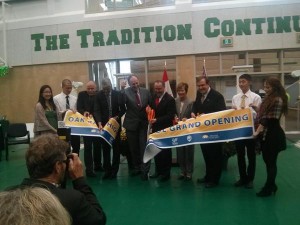 I’ve only mentioned a few former alumni. Their successes could be yours. No, their successes will be yours as you continue your journey whose foundation began with the outstanding education you will receive at this new school.
I’ve only mentioned a few former alumni. Their successes could be yours. No, their successes will be yours as you continue your journey whose foundation began with the outstanding education you will receive at this new school.
I want to offer my sincere thanks to all the dedicated teachers, administrators and staff at Oak Bay – collectively you have contributed so much to the success of the students and the wonderful culture that exists here. I also want to acknowledge with gratitude the dedicated district leadership, my predecessor Ida Chong, and this government for their ongoing commitment to build this remarkable new facility.
Congratulations on the opening of the New Oak Bay High School and thank you for the opportunity to address you today. Enjoy your new school and continue your proud tradition of excellence in whatever path you choose to follow.
Bill 29 – Property Taxation (Exemptions) Statutes Amendment Act
Today in the Legislature I rose to speak in support of Bill 29 – Property Taxation (Exemptions) Statutes Amendment Act, 2015.
Bill 29 ensures that there is consistent treatment across the province with respect to the way independent schools are subjected to municipal property taxation. Presently only the land immediately under a school building is exempt from municipal taxation. While most municipalities extend the exemption to the rest of the school property (playgrounds, playing fields etc.) there have been a few exceptions and some municipalities are contemplating the idea.
Below is the text of my speech at second reading.
Text of 2nd Reading Speech
A. Weaver: It gives me great pleasure to stand and speak in support of Bill 29, Property Taxation (Exemptions) Statutes Amendment Act. My riding is particularly interesting in that there are presently six…. Well, there are five high schools now, but after the election boundaries are redefined, there’ll be six high schools. Three of them are public schools, and three of them are independent schools. Oak Bay, Lambrick, Mount Doug — public schools. St. Michaels and Maria Montessori are presently in the riding and independent schools. Glenlyon Norfolk, soon to be in the riding, as well, is another independent school.
We have much to be proud of, of our education system in British Columbia. Despite what some might have said, Canada ranks at the very top, internationally, in the program for international student assessment scores, particularly in the area of sciences and reading. If we look at the 2012 science rankings, worldwide, No. 1 was Shanghai, China. No. 2, Hong Kong, China. No. 3, Singapore. No. 4, Japan. No. 5, Finland. And No. 6, British Columbia.
Now, when you compare that to 2003, in fact, two of those — Shanghai and Singapore — were not part of the 2003 assessment. So in essence, British Columbia would have been ranked No. 4, worldwide, in terms of science achievement, whereas in 2003, British Columbia was ranked No. 6. So we have much to be proud of in British Columbia with respect to our science education.
The same is true with our language arts. In 2003, No. 1 in the world was Finland. Alberta was No. 2, and British Columbia, No. 3. Since 2002, a number of other jurisdictions have participated in the international PISA. So we see Shanghai and Singapore moving up. British Columbia dropped to No. 6, which would have been fifth if you accounted other jurisdictions that weren’t there.
But what is really important to note is how it did relative to other provinces in Canada and the much-touted Finnish education system. I’ll come to Finland in a second, because in 2003, Finland ranked No. 1 in science, No. 3 in mathematics and No. 1 in reading. British Columbia was sixth in science, fifth in mathematics and third in reading.
Now, what’s indicative of a government that has somewhat lost touch with developing advancements in education, for reasons unknown to anybody, the B.C. government sent a young person to Finland to study the Finnish system. I understand that if you’re looking at the 2003 PISA assessments, you might want to understand the Finnish system. But in 2012, British Columbia was above Finland in mathematics, was above Finland in reading and was tied, statistically so, in science. There’s much to be proud of about our education system in British Columbia, and we do not need to study the Finnish system to find that out.
We are the top-ranked province in Canada, in terms of science education as well as reading, and yet that was not the case in 2003. Alberta was the top-ranked province in all three areas covered by PISA. But there is one area that B.C. does have some trouble with and I would argue that this has nothing to do with the quality of our teachers in British Columbia, but rather as the quality of the means and the ways they’re being trained to teach mathematics.
Mathematics is the one subject where B.C. has dropped, relative to other jurisdictions, in the move that has moved mathematics from learning the times tables by rote memorizing — learning by memorization, a critical aspect of learning mathematics — and moving into trying to understand what that means. You should know that seven times eight is 56, right off the bat. That’s a critical building block. But you shouldn’t necessarily have to know in grade 3 that….
M. Farnworth: Nine times seven?
A. Weaver: Sixty-three, and nine times nine is 81.
But today in school you’re not taught nine times seven is 63. You’re taught that nine times seven is ten times seven minus one times seven. Now, that’s an abstract idea that many people in elementary education simply can’t grasp. If you want to know why we’re going down in maths, you have only to look at the way our teachers are being trained in the universities, not the quality of the teachers themselves. Apart from mathematics, we rank at the very top internationally.
I will not listen to those who bemoan the state of our education system in B.C. We rank second to no other province in terms of quality, and we’re one of the top nations internationally and certainly the top nation in the western hemisphere.
What does that have to do with the bill? Well, it has to do with treating independent schools the same as public schools. Presently, the contents of this bill are actually in play in the Vancouver Charter already. The Vancouver Charter is quite specific in terms of what can or cannot be included in property taxation. This bill essentially says to the rest of the province that we’re going to be consistent. Whether you be in Victoria, Prince George, Kelowna, whether you be in Fernie, whether you be in Haida Gwaii, Prince Rupert, schools will be treated one and the same in terms of their property taxation.
Many people often don’t realize that we’ve had independent schools in Canada since the 17th century when the first Catholic schools were established in Quebec. In many jurisdictions, we have publicly funded school boards that fall along denominational lines. In Ontario and Alberta, for example, we have Catholic school boards and we have non-Catholic school boards. They’re both public school systems that go back to Confederation days. Here in B.C., we would call Catholic schools independent schools, where in other provinces, they’re considered part of the public system.
We have other potential problems which exist presently. Let’s suppose right now that we have a Catholic school on church property. How does that fall within the property taxation realm? Is it a church? Is it an independent school? Is it in the Catholic school board? No. This needs to be cleared up. While this bill is very short in terms of length, it’s important in terms of substance, because it actually closes a lot of potential problems that could create a potpourri of odd property taxations across the province.
One of the things that I support in this bill is the fact that it does not apply to things like endowment lands, things like houses for staff, for example, if there may be some independent schools that provide housing for their teachers. There may be some other independent schools that have large endowment lands. These are not being covered under this legislation. It’s simply the school and that which is typically used in school.
There are benefits for that. A school in my riding, Glenlyon — well, soon to be my riding; half the school is in my riding — for example, has a lovely Astro Turf field that is used by the local community in partnership, the Bays United soccer community. They have a public relationship with the independent school, yet there is a potential — it’s not right now — for that to be taxed, even though the public is benefiting from this field that is used by all.
In summary, then, first off I would like to recognize that we do have an outstanding education system. It does not help our education system when we continue to bemoan the problems in it instead of celebrating the successes in it. Sure, there are problems in our education system. There are problems in everything around us. But we will not move this education system forward if all we do is fixate on the negative that’s in it.
Secondly, I think fairness is critical. This bill provides fairness, recognizing that there are other provinces where independent schools, like the Catholic system, are actually part of the public system, whereas in B.C. we’ve never had Catholic school boards. Finally, it does not exclude some of the extraneous properties attached with an independent school. Those will be subject to municipal taxes.
With that, I thank you for your time. I’m only sad that the new Minister of Education is no longer sitting beside me, but across the hall. I do appreciate your office, hon. Speaker, and of those House Leaders, in preparing me here in the Legislature for two upcoming by-elections so that my colleagues can sit beside me.
Video of 2nd Reading Speech
The Vote
Second reading of Bill 29 approved unanimously on a division.

